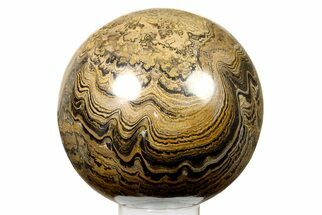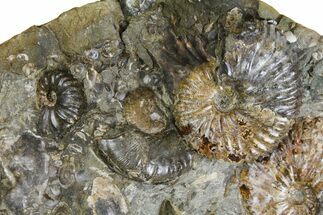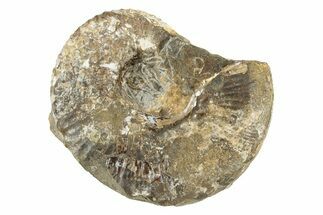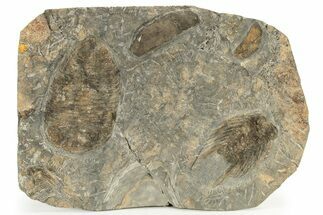This Specimen has been sold.
2.55" Polished Stromatolite (Greysonia) Sphere - Bolivia
There has been a lot of confusion about the age of these stromatolites. Most sources, including some fairly authoritative ones, have listed them as being Paleoproterozoic (Pre-Cambrian) in age, at least about 540 million years ago. Based on further research, we have determined that this is incorrect and they are in fact from the Upper Cretaceous Miraflores Formation of Bolivia and only about 66 millions years old.
About Stromatolites
Stromatolites are fascinating, ancient rock formations created by the activity of cyanobacteria and other microorganisms. These layered, mound-like structures represent some of the earliest evidence of life on Earth, dating back over 3.5 billion years. Often found in shallow, warm waters, stromatolites form as layers of sediment and minerals are trapped and bound by microbial mats, gradually building up over time into unique, textured shapes.
Visually, stromatolites can range from smooth, rounded forms to intricate, banded structures, with colors that span earthy reds, browns, greens, and grays. Each layer captures a record of environmental conditions at the time of its formation, making stromatolites an invaluable source of information for scientists studying Earth’s early history and the origins of life.
Today, fossilized stromatolites are highly prized by collectors, both for their scientific significance and their natural beauty. Some living stromatolites can still be found in a few rare locations around the world, such as Shark Bay in Australia and certain alkaline lakes.
Stromatolites are fascinating, ancient rock formations created by the activity of cyanobacteria and other microorganisms. These layered, mound-like structures represent some of the earliest evidence of life on Earth, dating back over 3.5 billion years. Often found in shallow, warm waters, stromatolites form as layers of sediment and minerals are trapped and bound by microbial mats, gradually building up over time into unique, textured shapes.
Visually, stromatolites can range from smooth, rounded forms to intricate, banded structures, with colors that span earthy reds, browns, greens, and grays. Each layer captures a record of environmental conditions at the time of its formation, making stromatolites an invaluable source of information for scientists studying Earth’s early history and the origins of life.
Today, fossilized stromatolites are highly prized by collectors, both for their scientific significance and their natural beauty. Some living stromatolites can still be found in a few rare locations around the world, such as Shark Bay in Australia and certain alkaline lakes.
SPECIES
Greysonia sp.
LOCATION
El Molino, Cerro Huanaquinn, Bolivia
FORMATION
Miraflores Formation
SIZE
2.55" in diameter
CATEGORY
ITEM
#264442
We guarantee the authenticity of all of our specimens.
 Reviews
Reviews











